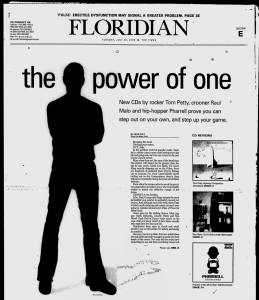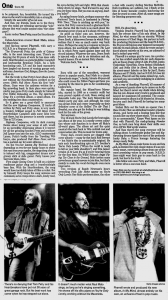CD Reviews: the power of one
By Sean Daly
St. Petersburg Times - Tuesday, July 25, 2006
New CDs by rocker Tom Petty, crooner Raul Malo and hip-hopper Pharrell prove you can step out on your own, and step up your game.
Tom Petty | Highway Companion | (American) | Grade: A
Breaking the band.
Ditching your mates.
D.I.Y., baby.
In the perilous world of popular music, there isn't a riskier career move than leaving your day job and going solo, be it for one record or the rest of your cursed career.
More often than not, the sum of the band (say, Van Halen) will always be far greater than the big fat ego (ouch, David Lee Roth). For every Sting smartly skipping out on the Police, there are hundreds of mulleted Steve Perrys flaking out on Journey. For every Lionel Richie wisely cutting out on the Commodores, there's Ozzy Osbourne besottedly biting the head off of Black Sabbath.
Even when the escape artist is one of the greatest songwriters in history, he or she is inevitably unable to match the collective oomph of the posse.
EXHIBIT A: the Beatles.
John, Paul, George and Ringo remain the most formidable pop quartet in anybody's record collection. And although each Fab (well, three Fabs at least) made enduring solo music, no one's ever going to mistake McCartney's Pipes of Peace for Abbey Road.
Same goes for the Rolling Stones. Mick Jagger, Keith Richards, Charlie Watts and Ron Wood: Each Hall of Famer made music on his own. And you know what? A lone Stone usually rolls right into the discount bin.
Bandmates keep egos in check and aren't afraid to say an idea stinks. It's safety, and sanity, in numbers.
But every once in a while, that rare artist blows the pop stand and still manages to make the best music of his career. Not only did the artist have something to say, but that something turned out to be poignant, fun, formidable. He turned his alone-in-the-world vulnerability into a strength.
Simply: He was better off on his own.
And that, my friends, leads us to the three men who today are releasing spectacular "solo" albums that won't make anyone miss "the other guys":
Iconic rocker Tom Petty, sans the Heartbreakers.
Cuban-American crooner Raul Mato, minus the Mavericks.
And hip-hop savant Pharrell, with nary a N.E.R.D. or a Neptune in sight.
The 55-year-old Petty, the pride of Gainesville, is the most interesting case. There's no denying the 30 years of work he has done with such Heartbreakers Mike Campbell and keyboardist Benmont Tench. As a fully functioning unit, T.P. and his loyal marauders have jangled out dozens of rousing garage rock anthems: American Girl, Refugee, Even the Losers, and so on.
But the truth is that Petty's best album is the one without the Heartbreakers credited on the cover: 1989's Full Moon Fever, his first "solo" album. Gone were the anthems written for a big sprawling band. In their place were quirky, catchy pop gems Petty made simply for himself: Free Falin', Depending on You, The Apartment Song. It's a cerebral album, a small album. It's also nothing less than a masterpiece.
So it gives me a great thrill to announce that the new Highway Companion, 12 tracks all written by Petty and Petty alone, is very much a bouncy, brilliant sequel to Full Moon Fever. Heartbreaker Campbell adds some licks here and there, but his presence is merely cosmetic. This is T.P.'s time.
Highway Companion, with its dark running theme about losing your sense of self, would be an incredibly depressing album if it weren't for all the grinning touches Petty and producer Jeff Lynne toss into the mix. (ELO mastermind Lynne, Petty's buddy from the Traveling Wilburys, also produced Full Moon Fever, and he has a puckish ear for sonic silliness.)
On the 9-to-5er lament Big Weekend, about depending on two-for-one happy hours to shake the rust from your psyche, the sing-along chorus is infused with big, exaggerated drums and a greasy lick of slide guitar. Petty knows your barroom blues, folks.
First single Saving Grace is built on a sinister, roadhouse guitar chug and a 'round-midnight bass line. With the Heartbreakers, the song would have inevitably taken off like a rocker. But by himself, Petty keeps the song ominous and contained, as he creeps down a dark, lonely road, his eyes darting left and right. With that classic whiny drawl, he sings, "And it's hard to say, who you are these days. But you run on anyway, don't you baby?"
An aging femme fatale, perhaps someone who shattered Tom's heart, is lambasted in Flirting With Time: "Time is catching up with you," he warns. But Petty concocts with such a glorious Byrdsian chorus that the track is as much about the cleansing power of pop as it is about evil women.
As good as those cuts are, however, the album's best track is the strummy, midtempo Down South, a bittersweet breeze in which Petty realizes that it was so much easier way back when. Perhaps the song is in response to his previous album, the acerbically unlikable The Last DJ, in which Petty raged against fame and the record industry. Whatever the case, Down South is injected with a c'est la vie defeatism and sly, hopeful humor. It's an instant Petty classic.
Welcome back, Tom.


